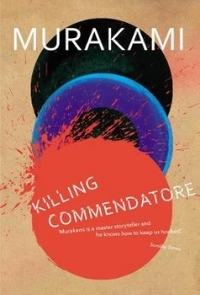
Killing Commendatore
Written by: Murakami Haruki
Reviewed by: Brad Williamson
Genre: Fantasy
Score: 3/5
Murakami Haruki is one of those few authors whose every book is worth reading; I don’t enjoy all his works to the same degree, but I would feel comfortable recommending any and every title as an introduction to him as a writer, as he has a knack for avoiding let-downs. He has novels, non-fiction, short story collections, all while changing genres yet retaining his unique themes and tone of the fantastical within reality. He is an all-time great author destined to be remembered with the likes of Fyodor Dostoevsky, Ursula K. Le Guin, and Gabriel Garcia Marquez, who has penned multiple masterpieces beloved regardless of translation or language. Still, I’m unsure how I feel about Killing Commendatore.
The book starts in expected fashion with a hazy and slightly confusing yet intriguing series of events, jumping back-and-forth in time and location, establishing a baseline of understanding and empathy for the novel’s first act. While reading it, I felt the first few chapters shared a kinship with his previous book, Colorless Tsukuru Tazaki. But then that first act stretches on, and on…and on, and that kinship falls away. You begin to wonder where the story is going, when something interesting will happen, but then you are drawn into the mood of the story. The middle portion of the book, even while not going anywhere or doing anything, is quite enjoyable and relaxing. It feels like the most interesting diary ever written, which is fine, and does feel like something Mr. Haruki would write, in many ways harkening back to Wind-up Bird in its tone and writing style. Still, throughout everything something feels like it is missing; I was never at any point drawn into the story and world as I have been with almost every other previous Murakami novel.
To me, the characters fall flat. None of them evolve beyond their introductions. If you like them upon meeting them, then you’ll enjoy reading about them throughout the story, but they’ll be the same people in the final meeting as they were in the initial one. This almost becomes a theme in the book and I do wonder if this aspect of the novel was written purposefully, so powerful was this feeling of a lack of character development within a novel by an author whose characters normally undergo tremendous changes. Another major theme of the novel seems to be the artistic process, so maybe he is trying to make a connection here between personal development and art, or maybe I missed where they evolved, or maybe the evolutions were more subtly and specifically Japanese than he normally describes and therefore easier to miss, or maybe he simply failed at developing them this time around. Whatever it was, something felt off with the entire cast.
The plot was also convoluted. His plots are usually strange and absurd, which is fun, but this one was neither strange nor absurd, instead appearing as a hodgepodge of unrelated ideas requiring random info dumps. The paranormal events usually become a focus in his stories, but they fall into the background and become unimportant in this one. Still, plot has never been a vital part of the Murakami reading experience, so this is okay, until the end.
The ending is where the book falls apart. The first 500 pages, despite my issues and complaints, feels like a perfectly fine, albeit different and slightly boring, Murakami novel; during the final 200 pages it seems boring, pointless, and ultimately fails to conclude anything.
Still. Mr. Haruki is one of my all-time favorite authors and I will continue to forever trumpet his work, so it pains me to write this review, but I must be honest. I didn’t like this book as much as I’d hoped to. But it was good enough in many ways that I must question how much of my dislike is a personal dislike and how much is a lackluster writing effort. When I consider it in this way, and when I think about how much I did enjoy the beginning, and when I acknowledge that even while I felt like I didn’t enjoy it, much of the time spent reading it went by in an enjoyable breeze, I begin to second-guess my thoughts. It’s as if he planned the book to continue on into the reader’s thoughts, as if the conclusion in the book weren’t truly its conclusion because each reader would individually make their own conclusion within their own mind following the cues he presented. As if the book were a mere introduction, almost a self-help guide for people who want to be artists, and that thinking about the book and its characters and its possible endings and concluding them for yourself will help each individual carry on with their own artistic endeavors following the conclusion of his own, thus linking writer and reader together in a strange loop. This theory goes along with the idea that the unfinished character arcs and conclusions were thematically vital to the novel as a whole and I must believe it holds credence.
I do wish the novel had ended differently, and I do wish it had been more interesting to read, but these wishes are offset by the depth I see in the work looking back on it. It’s not perfect and it’s possibly his only work I wouldn’t recommend to a first-time reader, but it’s definitely a Murakami book that every fan needs to read.
Recent Comments